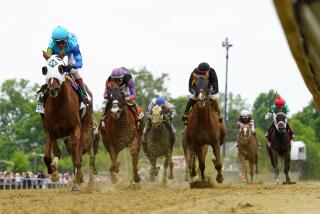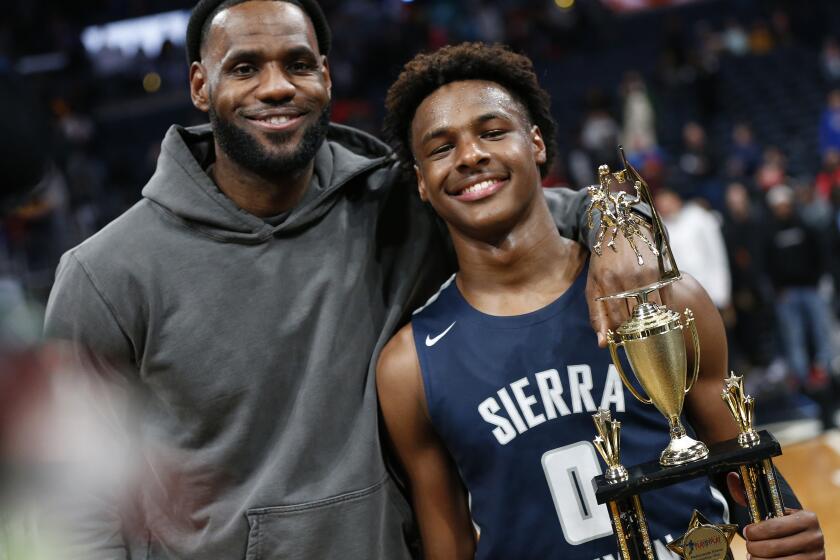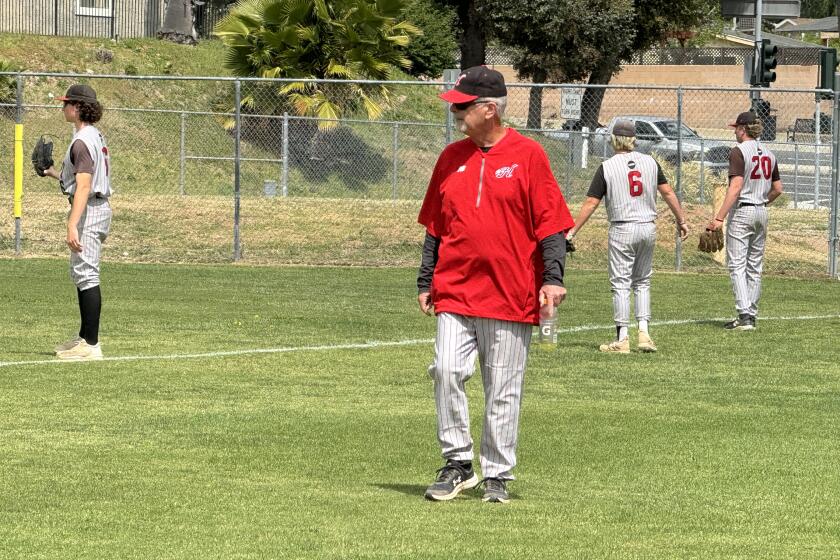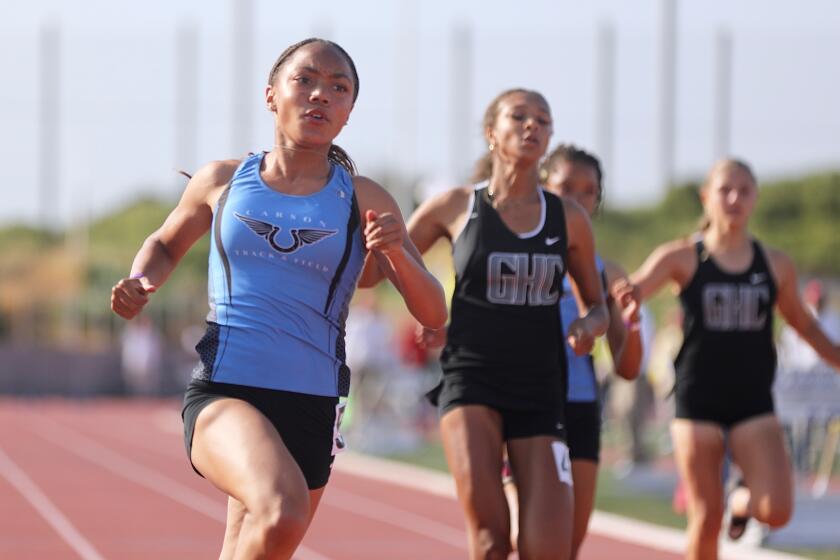Ex-Running Star Hulst Dies of Brain Cancer at 34
Eric Hulst, perhaps the best high school distance runner in Orange County history, died Sunday after a yearlong battle with brain cancer. He was 34.
Hulst, a track and cross-country standout at Laguna Beach High in the mid 1970s, experienced a brief remission earlier this year, enabling him to run up to five miles a day, more than he had run since a knee injury ended his career more than a decade ago.
But his health declined sharply in recent weeks, his mother, Sharon, said. Hulst became exhausted one night late last month after a short walk home from a Bible study. The next morning, he could barely move.
He died at 9:30 Sunday morning with his mother and sister, Heidi, at his side.
“His passing was very gentle,” Sharon Hulst said. “Just as he was.”
Certainly, track statisticians might remember Hulst for his impressive strength and endurance. His best time of 8 minutes 44.6 seconds, clocked as a senior in 1976, ranks him as the sixth-fastest prep two-miler in U.S. history. Hulst’s tenacity, his rivals said, was what made him special.
Hulst, they said, didn’t run for trophies or headlines, but rather for the simple pleasure of seeing how far and fast his body could go. And, even in recent years, he could never understand why other runners, some he didn’t even know, came up to shake his hand.
“He was just pure that way,” said Ralph Serna, a top rival of Hulst’s while at Loara High, and later a teammate at UC Irvine. “It wasn’t for the glory or the records. It was just for the love of running.
“If I knew anyone who was into ‘Zen and the pure art of running,’ it was Eric. He was less cocky than anyone I met.”
Hulst certainly had reason to be proud of his accomplishments. As a freshman at Laguna Beach, he decided to go out for cross-country to get in shape for tennis, his first love. But he became a running sensation almost overnight.
Hulst ran 9:04.4 for the two miles as a freshman, 8:50.6 as a sophomore and 8:44.9 as a junior--all stand as national class records today. He won three Southern Section cross-country titles and the world cross-country championship for juniors (19-and-under) in 1976.
His training sometimes brought him as much notoriety as his racing. Hulst ran up to 130 miles a week, sometimes while wearing a lead vest or carrying four-pound hand weights he made from steel pipes filled with casings of bullets he collected from a nearby shooting range.
“All to combat Ralph Serna’s kick,” Hulst said with a laugh earlier this year.
The Hulst-Serna duels often brought crowds to their feet. Serna, who weighed about 100 pounds, had perfect form and superior speed. Hulst was a muscular front-runner, able to set a fast pace and stick with it.
“Eric had one gear and it was to the wall,” said Doug Speck of Track & Field News.
Said Serna: “It was especially difficult to run against Eric because there was no way to psyche him out. . . . At the State meet (in 1975), he led the entire race. I stayed right behind him. With 300 meters to go, I tried to pass, but he reacted. I came up on his shoulder, but he held me off. I tried to pass him on the backstretch, too--he held me off again. Coming into the homestretch, he had me.”
By a margin of 8:44.9 to 8:45.9.
“I think Eric was the most prolific high school runner I ever saw,” said Len Miller, who coached Hulst in his early years at Laguna Beach and later at UCI. “If you think about Steve Prefontaine or Jim Ryun, Eric Hulst as a high school distance runner was as great as any of them.”
But in college, a knee injury, along with an increasing disinterest in academics, led Hulst to drop out after his sophomore year. Years later, he reflected on the abrupt finish to his career without bitterness. He developed other interests such as photography and working with stained glass. He rode his bicycle, sometimes hundreds of miles in one day.
“Athletes need to understand there are other things,” he said.
When doctors told him in the spring of 1991 they would have to surgically remove a large tumor in his brain, Hulst remained positive. Months later, after six weeks of radiation therapy, he started daily physical rehabilitation, and constructed pulleys over the head of his bed to strengthen his arms and shoulders.
Throughout his remission, Hulst spoke of riding his bike again and gaining enough mobility in his fingers to play guitar. He started making plans for a career in photography, and, possibly, a return to competitive running.
All the while, he seemed to have little trouble making light of his cancer. He made jokes often, and said he often closed his eyes and visualized standing just outside his ear. Jesus would be standing at his side, with a blowtorch in his hand.
“We’d walk into my ear and find the tumor,” Hulst said. “I’d say, ‘C’mon, Jesus, let’s go torch that little sucker.”
A memorial service will be held at 4 p.m. Tuesday, June 30 at Mariners Church in Newport Beach. The service is open to the public and will feature a short video highlighting Hulst’s life and passages from his training diaries.
A reception will follow outside the church, beside the large, jacaranda tree planted last month as a memorial to Hulst.
In lieu of flowers, the family requests that those wishing to donate do so through the Laguna Beach High School Foundation, care of Laguna Beach High School, 625 Park Ave., Laguna Beach, 92651. A $500 annual scholarship has been set up in Hulst’s name.
More to Read
Get our high school sports newsletter
Prep Rally is devoted to the SoCal high school sports experience, bringing you scores, stories and a behind-the-scenes look at what makes prep sports so popular.
You may occasionally receive promotional content from the Los Angeles Times.






